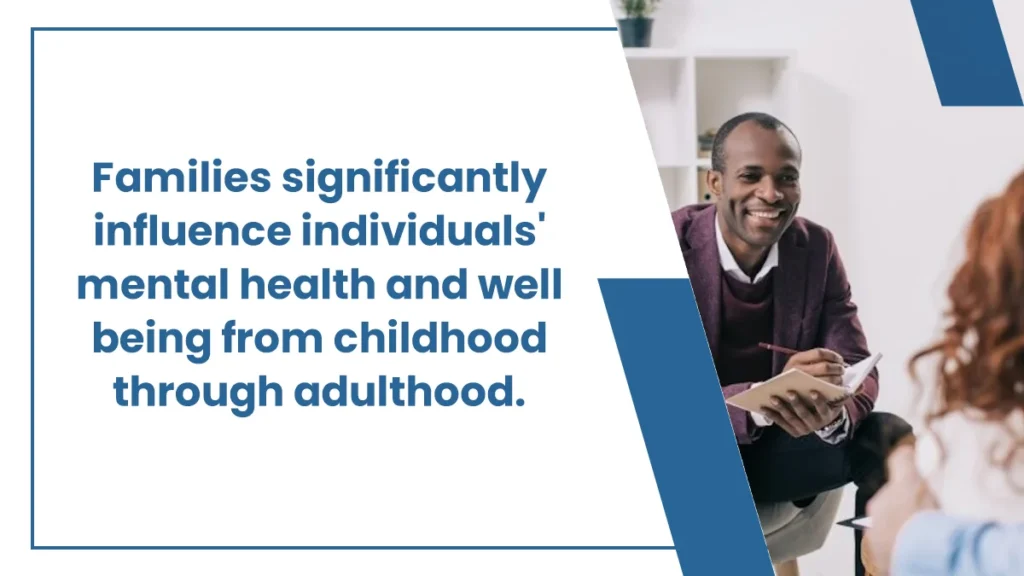Our surroundings and relationships deeply influence mental health. The environment in which we grow up and learn about the world can set us up to tackle the world with resilience or to crush under pressure. Family has a huge impact on our mental health. Keep reading to discover how to strengthen the family for better mental health.

Key Takeaways
The family is a keystone in fostering and maintaining positive mental health outcomes for people. Read on to explore the following:
- Families significantly influence individuals’ mental health and well-being from childhood through adulthood.
- Mental illness in a loved one challenges families in various ways.
- Families should opt for effective coping strategies to help their loved ones.
The Haven Detox-Little Rock is here to provide guidance and support. Call us at (501) 271-3342 for more information.
Role of Family in Mental Health
The role of family in mental health is important and multifaceted. Families play a significant role in shaping an individual’s mental health and well-being from early childhood through adulthood.
Here are several key aspects of the role of family in mental health:
Support System
Families serve as primary sources of emotional support for their members. Emotional support from family members can help individuals cope with stress, trauma, and other challenges, thus promoting better mental health outcomes.
Early Development
Family dynamics and interactions during early childhood significantly influence a person’s mental health later in life. Positive family environments characterized by warmth, responsiveness, and consistency contribute to good emotional health.
Genetic Factors
Familial history can indicate genetic tendencies toward specific mental health conditions. Understanding family history and genetics can help individuals and families recognize potential risk factors, take preventive measures, or seek appropriate interventions.
Socialization
Families play a central role in teaching social skills, communication strategies, and problem-solving techniques. These skills are essential for navigating relationships and managing stress effectively, both crucial for mental well-being.
Crisis Intervention
During times of crisis or mental health problems, families often provide immediate support and intervention. Family members can help identify warning signs, facilitate access to mental health services, and provide ongoing encouragement and assistance.
Stigma Reduction
Families can contribute to reducing the stigma associated with mental illness by promoting open communication, understanding, and acceptance. Creating a supportive and non-judgmental family environment encourages individuals to seek help without fear of stigma or discrimination.
Communication Patterns
Healthy communication patterns within families can foster trust, empathy, and emotional resilience. Conversely, dysfunctional communication patterns characterized by conflict, criticism, or emotional neglect can contribute to mental health issues such as anxiety, depression, or low self-esteem.
Trauma and Adversity
Family experiences of trauma, physical abuse, or adverse life events can have profound effects on mental health outcomes for individuals. Recognizing and addressing the impact of past trauma within the family system is essential for promoting healing and resilience.
Therapeutic Interventions
Family therapy and counseling can be effective interventions for addressing relational issues, improving communication, and resolving conflicts within the family. These therapeutic approaches can enhance family cohesion and resilience while supporting individual mental health and well-being.
Overall, the family plays a central role in promoting and maintaining mental health care for its members through various means, including emotional support, socialization, crisis intervention, stigma reduction, and access to care.
Impact of Mental Illness on Families
The impact of mental health issues on families can be profound and wide-ranging, affecting various aspects of family dynamics, relationships, and overall well-being.
Here are some key ways in which mental illness can impact families:
Emotional Strain
Families may experience significant emotional distress when a member is struggling with mental illness. Feelings of sadness, worry, guilt, and frustration are common among family members who may feel helpless or uncertain about supporting their loved ones.
Disrupted Relationships
Mental illness can strain relationships within families, leading to increased conflict, tension, and misunderstandings. Communication breakdowns, withdrawal, or unpredictable behavioral problems associated with mental illness can challenge family cohesion and stability.
Role Changes
Family members may need to take on new roles and responsibilities to provide care and support for the individual with mental illness. This can disrupt traditional family roles and dynamics, leading to role confusion or resentment among family members.
Financial Burden
The costs associated with mental health treatment, medication, therapy, and other support services can place a significant financial burden on families. This burden may be worsened if the individual with mental illness is unable to work or requires long-term care.
Social Isolation
Families may experience social isolation or stigma due to the misconceptions and stereotypes surrounding mental illness. Fear of judgment or discrimination may lead families to withdraw from social activities or limit interactions, further exacerbating feelings of loneliness and isolation.
Caregiver Stress
Family members who take on caregiving responsibilities for a loved one with mental illness may experience high levels of stress, burnout, and physical exhaustion. Balancing caregiving duties with other commitments such as work, household tasks, and personal needs can be overwhelming.
Impact on Children’s Mental Health
Children raised in families impacted by mental illness may experience adverse effects on their development, including emotional distress, academic difficulties, and challenges in forming healthy relationships. They may also assume caregiving roles affecting their well-being and prospects.
Overall, the profound impact of mental illness on families is complex and multifaceted, requiring a comprehensive approach that addresses the needs of both the individual with mental illness and their family members.
Families Supporting a Loved One with Mental Illness
Supporting a loved one with mental illness can be challenging, but there are strategies that families can employ to provide adequate support.
Here are some suggestions:
Educate Yourself
Learn about your loved one’s mental illness, its symptoms, treatment options, and how it may affect their daily life. Understanding the condition can help you provide more informed support.
Encourage Treatment
Support and urge your loved one to seek professional assistance and help them follow their treatment plan, whether it involves therapy, medication, or other forms of treatment.
Communicate Openly
Foster transparent and sincere communication with your loved ones, parents, and friends about their mental health. Please support them in expressing their feelings and concerns and listen to them without criticism.
Set Realistic Expectations
Understand that recovery from mental illness takes time and may involve setbacks. Set realistic expectations and be patient and supportive throughout the process.
Provide Emotional Support
Emotional support to your loved one involves deeply understanding their feelings and experiences and ensuring they feel heard and validated. Take the time to listen actively and empathetically, acknowledging the validity of their emotions without judgment.
Respect Boundaries
Respect your loved one’s boundaries and privacy. Avoid pressuring them to talk about their mental health if they’re not ready, but let them know you’re available to listen whenever they need.
Encourage Self-care
Encourage your loved one to engage in self-care activities that promote their mental and physical health, such as exercise, proper nutrition, adequate sleep, and stress management techniques.
Seek Support for Yourself
Supporting a loved one with a mental illness can be emotionally taxing. Make sure to take care of your mental health by seeking support from friends, family members, support groups, or a doctor.
Be Patient and Flexible
Be patient and flexible as your loved one navigates their mental health journey. Understand that there may be ups and downs, and be prepared to adapt your support strategies as needed.
Reduce Stigma
Challenge stigma and discrimination surrounding serious mental illness by educating others and advocating for greater understanding and acceptance.
Celebrate Progress
Celebrate your loved one’s achievements, no matter how small. Recognize their efforts and progress towards recovery. By celebrating these milestones together, you validate their hard work and motivate them to continue moving forward, one step at a time.
Create a Supportive Environment
Foster a supportive and nurturing environment at home by promoting positive interactions, avoiding criticism, and encouraging open communication.
Remember that every individual’s experience with mental illness is unique, so it’s essential to tailor your support approach to meet your loved one’s specific needs and preferences.
Frequently Asked Questions (FAQ)
How does mental health affect the family?
Mental health issues can stress family relationships, causing stress, conflict, and emotional upheaval. Families may experience financial burdens, disruptions in daily routines, and feelings of helplessness or guilt, impacting overall well-being and requiring adjustments to support and maintain stability.
How do you deal with a mentally unstable family member?
Dealing with a mentally unstable family member involves offering understanding, patience, and support. Please encourage them to seek professional help, maintain open communication, set boundaries when necessary, and prioritize self-care for yourself and the affected individual.
What is the link between mental illness and family history?
Mental illness can have a genetic component, with certain disorders being more prevalent among family members. While genetics play a role, environmental factors and upbringing contribute, highlighting the complex interplay between genetics, family dynamics, and mental health outcomes.
The Haven Detox-Little Rock
Struggling with mental health issues is overwhelming, but you’re not alone. The Haven Detox-Little Rock is here to provide support and assistance.
Our facility offers a wide range of specialized mental health services to meet your unique needs and circumstances. Our residential rehab comprised a combination of therapy, medication, and peer support to help people struggling with mental health issues embrace long-term recovery. Take the first steps toward your healing journey by calling (501) 271-3342.




